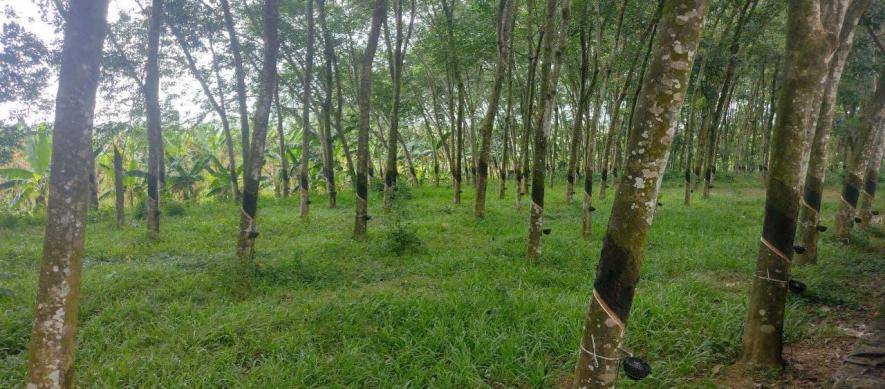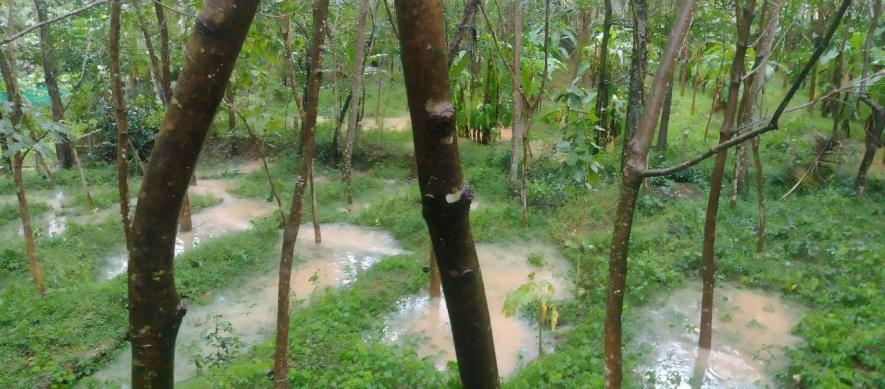TN: Monsoon Hits Rubber Plantation Workers, Govt Relief Remains Elusive

A rubber plantation in Kanyakumari district
A typical day for 61-year-old Natarajan, a rubber plantation worker in the Kanyakumari district, starts as early as 6 am. After tapping latex from the trees, collecting and processing them, he returns home after 2 pm. But, since August this year, incessant rains have left him without work and wage.
The situation has been bad throughout 2021, with lockdown and monsoons impacting the livelihood of the plantation workers. Natarajan also said that the workers had hardly 100 days of work this year.
Around 30,000 workers depending on the state government, privately owned estates, and marginal and small plantations face a similar fate. The workers in the state-owned Arasu Rubber Corporation (ARC) plantations include Srilankan refugees. Rubber plantations are the most commonly grown crop in the district, with paddy occupying the second position.
Since the Kanyakumari district in Tamil Nadu receives rains from both the northeast and southwest monsoons, the plantation workers are seeking compensation for the months when their work and income are lost to save their livelihood. The lack of a welfare board has led to the workers being bereaved of relief measures, forcing them into debt.
‘30,000 WORKERS AFFECTED’
Heavy rains have lashed Kanyakumari for the last three months without a break. The district was inundated for several days together, with chief minister M K Stalin paying a visit to access the damages.
With several sections of the workers badly affected, plantation workers like Natarajan remain jobless. “Never before in our life have we suffered this way without working days,” he said.
Dry weather is required for the workers to venture to the plantations in the early morning. If mixed with rainwater, the latex will not cater to the requirements.
“We have to walk several km to reach the plantations and have to walk around the plantation to tap the trees. Even with a small drizzle, the tapping will be aborted, which leads to workers losing wages for the day,” Natarajan said.
The workers of the ARC and private estates are paid Rs 110 as rain day allowance who arrive in the plantations and record their attendance, thanks to the sustained struggles of the trade unions.

Continuous rains have led to water stagnation in rubber plantations in the hilly and other areas
M Valsa Kumar, general secretary of the Kanyakumari district Plantation Workers Union of the Centre of Indian Trade Unions (CITU) said that more than 30,000 workers are not covered under this protection.
“These workers have had no work and no wage for the past several months. With the present forecast, it is most likely they will remain jobless during December as well. The yield of the rubber will reduce with severe water stagnation in many places,” he said.
The workers receive around Rs 500 as wage/day on working days, if they satisfy the 8 kg latex collection from around 350-400 trees. They are also penalised Rs 8/kg if the procurement is below the benchmark set.
‘GOVT NOT LISTENING TO DEMANDS’
The workers and the CITU have been demanding relief for all the workers involved in the plantation industry during monsoon seasons to ensure they do not starve. The workers suffered similar issues during the COVID-19 lockdown last year and were severely affected due to the cyclones like Okhi in recent years.
"Kanyakumari is the only district in the state to have rubber plantations. Though this has helped in the economic growth of the district and the state, the sufferings of the workers and small farmers are hardly attended to by the government," Kumar said.
The CITU has been seeking a monthly relief of Rs 5,000 during the months when the monsoon hits the districts, leading to loss of jobs for the workers.
"The government is providing relief for the fishing community during the ban. Similarly, the state government must extend relief to the plantation workers as well," Natarajan said.
Other workers' demands, including proper housing, education and healthcare facilities in the sprawling estates, have not been listened to.
"The physical work of tapping and walking KMs takes a lot out of the workers, and they face multiple health issues. As per the company act, the workers must be provided adequate healthcare, housing and education facilities, since such facilities are inaccessible due to distance from the nearby towns," Natarajan said.
The workers also face the threat of wild animals since their work starts in the early morning when the latex yield will be higher in the absence of sunlight.
'SAVE PLANTATIONS AND WORKERS'
Rubber plantations are one of the major commercial crops in the district, with plantations spreading across 28,358 hectares (ha) as per the district statistical handbook 2020. Paddy is cultivated in almost one-third of this area, in 10,970 ha.
The ARC, in four divisions in the district with 3,985.69 ha of plantation, employs 795 daily wage workers, including 202 Srilankan refugees. The corporation also employs 400 casual labourers.
"The ARC, despite being a state-run public sector company, is not regularising workers even as they fulfil the requirements. The corporation also handed over around 1,000 ha of land back to the forest department, which also will reduce employment," Kumar said.
The workers also allege poor maintenance of the newly planted rubber saplings by the corporation, leading to further loss. "The private estates exploit the workers, while government-run ARC is violating rules on regularising employees anD improper maintenance of the plantations," Kumar added.
The lack of a welfare board for the workers leaves them at the mercy of the private estate owners, forcing them to borrow during the monsoon seasons.
"The Tamil Nadu government must constitute a welfare board for plantation workers like Kerala and provide sufficient relief and benefits for the workers during such a situation," Natarajan demanded.
Get the latest reports & analysis with people's perspective on Protests, movements & deep analytical videos, discussions of the current affairs in your Telegram app. Subscribe to NewsClick's Telegram channel & get Real-Time updates on stories, as they get published on our website.























